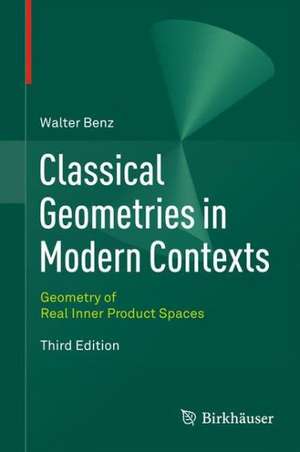Classical Geometries in Modern Contexts: Geometry of Real Inner Product Spaces Third Edition
Autor Walter Benzen Limba Engleză Paperback – 19 sep 2014
Proofs of newer theorems characterizing isometries and Lorentz transformations under mild hypotheses are included, such as for instance infinite dimensional versions of famous theorems of A.D. Alexandrov on Lorentz transformations. A real benefit is the dimension-free approach to important geometrical theories.
New to this third edition is a chapter dealing with a simple and great idea of Leibniz that allows us to characterize, for these same spaces X, hyperplanes of euclidean, hyperbolic geometry, or spherical geometry, the geometries of Lorentz-Minkowski and de Sitter, and this through finite or infinite dimensions greater than 1.
Another new and fundamental result in this edition concerns the representation of hyperbolic motions, their form and their transformations. Further we show that the geometry (P,G) of segments based on X is isomorphic to the hyperbolic geometry over X. Here P collects all x in X of norm less than one, G is defined to be the group of bijections of P transforming segments of P onto segments.
The only prerequisites for reading this book are basic linear algebra and basic 2- and 3-dimensional real geometry. This implies that mathematicians who have not so far been especially interested in geometry could study and understand some of the great ideas of classical geometries in modern and general contexts.
| Toate formatele și edițiile | Preț | Express |
|---|---|---|
| Paperback (1) | 563.08 lei 38-44 zile | |
| Springer – 19 sep 2014 | 563.08 lei 38-44 zile | |
| Hardback (1) | 646.11 lei 6-8 săpt. | |
| Springer – 13 aug 2012 | 646.11 lei 6-8 săpt. |
Preț: 563.08 lei
Preț vechi: 703.86 lei
-20% Nou
Puncte Express: 845
Preț estimativ în valută:
107.75€ • 112.78$ • 89.68£
107.75€ • 112.78$ • 89.68£
Carte tipărită la comandă
Livrare economică 27 martie-02 aprilie
Preluare comenzi: 021 569.72.76
Specificații
ISBN-13: 9783034807418
ISBN-10: 3034807414
Pagini: 328
Ilustrații: XVIII, 310 p.
Dimensiuni: 155 x 235 x 17 mm
Greutate: 0.46 kg
Ediția:3rd ed. 2012
Editura: Springer
Colecția Birkhäuser
Locul publicării:Basel, Switzerland
ISBN-10: 3034807414
Pagini: 328
Ilustrații: XVIII, 310 p.
Dimensiuni: 155 x 235 x 17 mm
Greutate: 0.46 kg
Ediția:3rd ed. 2012
Editura: Springer
Colecția Birkhäuser
Locul publicării:Basel, Switzerland
Public țintă
ResearchCuprins
Preface.- 1 Translation Groups.- 2 Euclidean and Hyperbolic Geometry.- 3 Sphere Geometries of Möbius and Lie.- 4 Lorentz Transformations.- 5 δ–Projective Mappings, Isomorphism Theorems.- 6 Planes of Leibniz, Lines of Weierstrass, Varia.- A Notation and symbols.- B Bibliography.- Index.
Recenzii
The precise and clear style of the presented matter enables the reader (with some basic knowledge) to obtain some profound insight into this field of geometry. [...] The book can be recommended to students and teachers who want to get into the state of the art of this theory.
Review of the 2nd edition by O. Röschel (Graz)
Internationale Mathematische Nachrichten Nr. 212, Dez. 2009
[...] The book on the one hand brings together many elder results scattered through the literature and on the other hand leads to the frontier of research. Thus it is highly welcomed and can be recommended warmly to anyone interested in this topic.
Review of the first edition by G. Kowol, Vienna
Monatshefte für Mathematik Vol. 150, No. 3/2007
"... The mathematical prerequisites are minimal - the rudiments of linear algebra suffice - and all theorems are proved in detail. Following the proofs does not involve more than following the lines of a computation, and the author makes every effort to avoid referring to a synthetic geometric understanding, given that he aims at attracting readers with a distaste for synthetic geometry, which, given the academic curricula of the past decades, represent the overwhelming majority of potential readers of any mathematical monograph. One of the lessons of this monograph is that there is a coordinate-free analytic geometry, which significantly simplifies computations and frees the mind from redundant assumptions. the author makes every effort to avoid referring to a synthetic geometric understanding, given that he aims at attracting readers with a distaste for synthetic geometry, which, given the academic curricula of the past decades, represent the overwhelming majority of potential readers of any mathematical monograph. One of the lessons of this monograph is that there is a coordinate-free analytic geometry, which significantly simplifies computations and frees the mind from redundant assumptions. ..."
Review of the first edition by Victor V. Pambuccian, Mathematical Reviews 2006
Review of the 2nd edition by O. Röschel (Graz)
Internationale Mathematische Nachrichten Nr. 212, Dez. 2009
[...] The book on the one hand brings together many elder results scattered through the literature and on the other hand leads to the frontier of research. Thus it is highly welcomed and can be recommended warmly to anyone interested in this topic.
Review of the first edition by G. Kowol, Vienna
Monatshefte für Mathematik Vol. 150, No. 3/2007
"... The mathematical prerequisites are minimal - the rudiments of linear algebra suffice - and all theorems are proved in detail. Following the proofs does not involve more than following the lines of a computation, and the author makes every effort to avoid referring to a synthetic geometric understanding, given that he aims at attracting readers with a distaste for synthetic geometry, which, given the academic curricula of the past decades, represent the overwhelming majority of potential readers of any mathematical monograph. One of the lessons of this monograph is that there is a coordinate-free analytic geometry, which significantly simplifies computations and frees the mind from redundant assumptions. the author makes every effort to avoid referring to a synthetic geometric understanding, given that he aims at attracting readers with a distaste for synthetic geometry, which, given the academic curricula of the past decades, represent the overwhelming majority of potential readers of any mathematical monograph. One of the lessons of this monograph is that there is a coordinate-free analytic geometry, which significantly simplifies computations and frees the mind from redundant assumptions. ..."
Review of the first edition by Victor V. Pambuccian, Mathematical Reviews 2006
Textul de pe ultima copertă
The focus of this book and its geometric notions is on real vector spaces X that are finite or infinite inner product spaces of arbitrary dimension greater than or equal to 2. It characterizes both euclidean and hyperbolic geometry with respect to natural properties of (general) translations and general distances of X. Also for these spaces X, it studies the sphere geometries of Möbius and Lie as well as geometries where Lorentz transformations play the key role.
Proofs of newer theorems characterizing isometries and Lorentz transformations under mild hypotheses are included, such as for instance infinite dimensional versions of famous theorems of A.D. Alexandrov on Lorentz transformations. A real benefit is the dimension-free approach to important geometrical theories.
New to this third edition is a chapter dealing with a simple and great idea of Leibniz that allows us to characterize, for these same spaces X, hyperplanes of euclidean, hyperbolic geometry, or spherical geometry, the geometries of Lorentz-Minkowski and de Sitter, and this through finite or infinite dimensions greater than 1.
Another new and fundamental result in this edition concerns the representation of hyperbolic motions, their form and their transformations. Further we show that the geometry (P,G) of segments based on X is isomorphic to the hyperbolic geometry over X. Here P collects all x in X of norm less than one, G is defined to be the group of bijections of P transforming segments of P onto segments.
The only prerequisites for reading this book are basic linear algebra and basic 2- and 3-dimensional real geometry. This implies that mathematicians who have not so far been especially interested in geometry could study and understand some of the great ideas of classical geometries in modern and general contexts.
Proofs of newer theorems characterizing isometries and Lorentz transformations under mild hypotheses are included, such as for instance infinite dimensional versions of famous theorems of A.D. Alexandrov on Lorentz transformations. A real benefit is the dimension-free approach to important geometrical theories.
New to this third edition is a chapter dealing with a simple and great idea of Leibniz that allows us to characterize, for these same spaces X, hyperplanes of euclidean, hyperbolic geometry, or spherical geometry, the geometries of Lorentz-Minkowski and de Sitter, and this through finite or infinite dimensions greater than 1.
Another new and fundamental result in this edition concerns the representation of hyperbolic motions, their form and their transformations. Further we show that the geometry (P,G) of segments based on X is isomorphic to the hyperbolic geometry over X. Here P collects all x in X of norm less than one, G is defined to be the group of bijections of P transforming segments of P onto segments.
The only prerequisites for reading this book are basic linear algebra and basic 2- and 3-dimensional real geometry. This implies that mathematicians who have not so far been especially interested in geometry could study and understand some of the great ideas of classical geometries in modern and general contexts.
Caracteristici
Dimension-free presentation Inclusion of proofs of newer theorems characterizing isometries and Lorentz transformations under mild hypotheses
Common presentation for finite and infinite dimensional real inner product spaces X on an elementary basis, i.e., avoiding transfinite methods
Highlights like the projective approach to dimension-free hyperbolic geometry or the principle of duality are developed
Includes supplementary material: sn.pub/extras
Includes supplementary material: sn.pub/extras
Common presentation for finite and infinite dimensional real inner product spaces X on an elementary basis, i.e., avoiding transfinite methods
Highlights like the projective approach to dimension-free hyperbolic geometry or the principle of duality are developed
Includes supplementary material: sn.pub/extras
Includes supplementary material: sn.pub/extras














